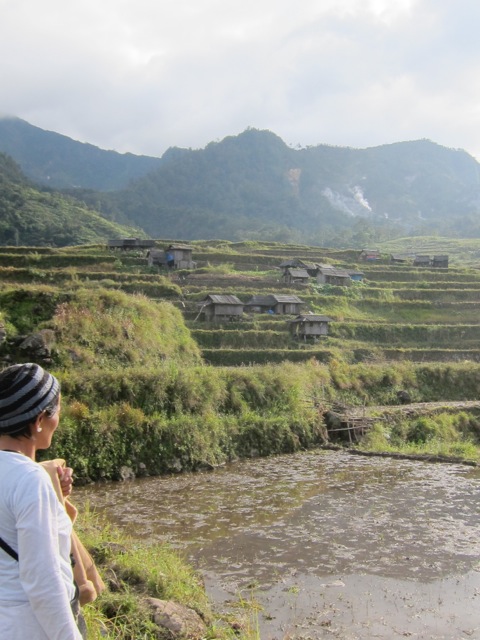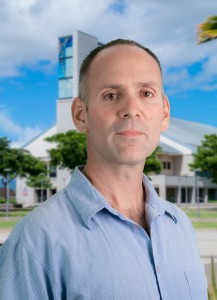
Traditional terrace production of heirloom rice in the upland Philippines. These 2,000 year-old terraces not only facilitate the production of the region’s staple crop, but also support montane ecosystems, helping to mitigate damage from typhoons.
UPDATED as of July 18: A podcast and article featuring interviews with Dr. Albie Miles, Dr. Marcia DeLonge and Dr. Liz Carlisle was added to this article.
UH West Oʻahu Assistant Professor of Sustainable Community Food Systems Albie Miles and colleagues Dr. Marcia DeLonge and Dr. Liz Carlisle’s Journal of Environmental Science & Policy article “Investing in the transition to sustainable agriculture,” was selected from thousands of recently published articles to win the Elsevier Atlas award. Elsevier, publisher of more than 1,800 journals about information solutions for science, health, and technology professionals, awards the Elsevier Atlas to one article every month featuring research that may significantly impact the lives of people around the world. The Elsevier Atlas award is presented by the publisher in order to bring wider attention to the awardee’s research and help ensure its successful implementation.
In “Investing in the transition to sustainable agriculture,” Dr. Albie Miles and his colleagues found:
- Much United States Department of Agriculture (USDA) research and extension funding is unrelated to sustainable agriculture. The USDA’s stated commitment to advancing sustainable agriculture is not backed up research dollars. Just 1.5% ($44 million) of the total USDA Research, Education, and Economics $2.8 billion budget is dedicated to agroecological projects.
- Many projects are focused on enhancing yields of crops or animal products. The USDA dedicated 35% of analyzed research funds ($105 million) for the purpose of increasing agricultural efficiencies either by increasing crop production or decreasing pesticide use.
- Fewer funds support substituting less damaging inputs into farming practices. Just 23% of analyzed funds ($69 million) are dedicated to ecological pest management, adopting alternative fertilizers, planting cover crops, and other practices that boost the health of farms, ranches and surrounding environments.
- Ecological agriculture is crucial but lacked funding. Of the USDA’s $2.8 billion spent on Research, Education and Economics, only $12 million (4% of the total research budget) was spent on practices that encourage a transition to sustainable food systems. Today’s farms and ranches contribute to air and water pollution, climate change, public health problems, biodiversity loss, and other concerns.
- More public funds are needed for agroecology and related socioeconomic supports.
Publications selected for the Elsevier Atlas are chosen by individual members of an external advisory board representing non-governmental organizations including
- Bioversity International
- The Clinton Foundation
- Healthcare Information for All (HIFA)
- Information Training and Outreach Centre for Africa
- OXFAM
- TEDMED
- University of California, Berkeley (Center for Effective Global Action) – Global Health Policy Institute
- United Nations Environment Programme
- United Nations University
Listen to the Elsevier complete podcast interview with Dr. Albie Miles, Dr. Marcia DeLonge and Dr. Liz Carlisle discussing their research and read excerpts of “Investing in Sustainable Agriculture: An analysis of federal funding for agroecological research shows tremendous untapped potential,” by Dr. Kendall Morgan on the Elsevier website.

UH West Oʻahu Assistant Professor of Sustainable Community Food Systems Albie Miles
Albie Miles
Albie Miles is assistant professor of sustainable community food systems at the University of Hawaiʻi – West Oʻahu. Miles received his PhD in environmental science, policy and management from the University of California, Berkeley in 2013. His natural science research explores the synergies between farming system biodiversity and the provisioning of globally important ecosystem services from agriculture. His social science research explores the socio-economic and political obstacles to a more ecologically sustainable and socially equitable food system. Miles teaches a wide range of courses on the topics of agroecology and sustainable food systems, and developed the undergraduate concentration in sustainable community food systems at UH West Oʻahu. He has an extensive background in curriculum development and post-secondary education emphasizing experiential and hands-on learning, and held posts at the Organic Agriculture Program at the United Nations Food and Agriculture Organization and the Center for Agroecology and Sustainable Food Systems at the University of California, Santa Cruz.
Related articles:
Agriculture study points to need for increased sustainable agriculture research funding
Investing in Agroecology: Study Reveals Lack of Funding for Sustainable Ag Research
UH West Oʻahu trains future food and agriculture professionals
Dr. Albie Miles and colleagues publish study on western grape leafhopper paratisoids
Sustainable Community Food Systems featured in national publication
Dr. Albie Miles publishes research on agroecology and food security in Africa
Dr. Albie Miles and colleagues publish new study on western grape leafhopper
Dr. Albie Miles’ edited volume Teaching Organic Farming & Gardening 3rd edition published
